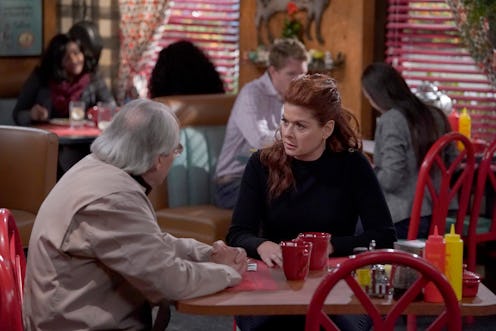Entertainment
'Will & Grace' Nails Exactly Why Sexual Assault Victims Don't Come Forward

Spoilers ahead for Will & Grace Season 2, Episode 5. Will & Grace has long used its humorous platform to broach hot button issues, tackling things like immigration and LGBT representation without ever bordering on cheesy. Case in point: Will & Grace's #MeToo episode, a deft installment that still carries the spirit of the show, but with a sobering reminder — that women have been trying to speak out about sexual assault and harassment for decades, but it's only now that the rest of the world has begun to listen. Warning: This article contains information about sexual assault, which some readers may find triggering.
In the episode, Grace goes on a road trip with her father, Martin, to visit the grave sites of a few people they were close to. At first, she's hesitant to spend so much one-on-one time with her dad. "We don't talk," she complains to Will. "The minute anything gets real, he gets uncomfortable." But he encourages Grace to use it as an opportunity to have those "real" conversations they've long avoided, and it ends up revealing some painful truths — about Grace, yes, but also about the ways in which women's voices have too often been ignored.
Eventually, Grace tells Martin she doesn't want to visit his friend Harry's grave. They get into an argument, and she reveals that one summer, when she was working for Harry, he sexually assaulted her, violently, in his office. Grace, then just 15, took money out of a desk for a cab and got out as quickly as she could. Her dad asks why she never told him the truth, and she says that she was worried he wouldn't believe her. But the reality is, she had already tried and failed; all her dad ever heard was that she stole money from his friend.
"The whole summer I was working for Harry I kept telling you that he was creepy," Grace explains. "What did you think that meant?" This, this is one of the most subtly powerful moments in the episode. When women tell other women to avoid a man, or that a man is a creep, gives off a bad vibe, has a reputation, or anything along those lines, they usually know exactly what it implies.
Men, on the other hand, seem to need it spelled out for them. Take, for example, the chorus of otherwise nice, supportive, and well-meaning men who, in the wake of #MeToo, have said they had no idea, or never would have suspected, sexual assault was such a widespread, systemic problem — as if a quick Google search wouldn't tell them one in five women are raped at some point in their lives.
However, if "I don't like that guy" or "he's a creep" were followed up with a "why" or a "how so," perhaps we would have been able to create open discourse much sooner. It's difficult enough for victims to come forward about sexual assault — because they're ashamed, because they're afraid, because they simply can't process such a traumatic experience. Having to also worry about how others will react — in Grace's case, risking making her dad feel, God forbid, uncomfortable — only makes it that much harder.
Further driving home the point, Will & Grace addresses what happens when sexual assault survivors can get out the words, only to have their experiences downplayed or dismissed. Early in the episode, Grace criticizes her dad for calling a waitress "sweetheart" and flirting with her. What follows, between that initial conversation and the story about Grace's assault, covers a lot of bullet points: "They like it," Martin says of the waitress. "Sometimes I feel like men can't be men anymore." And after Grace tells him about Harry: "That doesn't sound like Harry," "maybe you're misremembering what happened," "calm down," "it was a different time." These are all ways to minimize assault.
But Grace is firm. "That's not an excuse," she says, exasperated. "What, just because it was a different time, it wasn't bad? No, all that meant was that people got away with it." Preach!
It should be noted that in the episode's other storyline, a drag queen waiting on the rest of the gang at brunch hits on Will far more aggressively than Grace's dad did the waitress. But Will just shrugs off his remarks. This highlights that men face sexual harassment too — something else the #MeToo movement has brought to light — but the biggest difference in this specific circumstance is that the power dynamic between an older man and a waitress and two men of (relatively) the same age is not analogous. Neither instance of unsolicited suggestive comments is OK, but it's interesting that one is called out while the other is played for laughs.
As for Grace, her storyline shows exactly why whisper networks started. At some point, women gave up wasting energy trying to be heard by men and started devoting themselves to protecting other women instead. But it shouldn't be up to women, or sexual assault victims in general, to fight this battle on their own. Not anymore. So next time someone tells you that a person they know is a creep, or says someone makes them uneasy — ask them why, and more importantly, listen.
If you or someone you know has been sexually assaulted, call the National Sexual Assault Telephone Hotline at 800-656-HOPE (4673) or visit online.rainn.org.